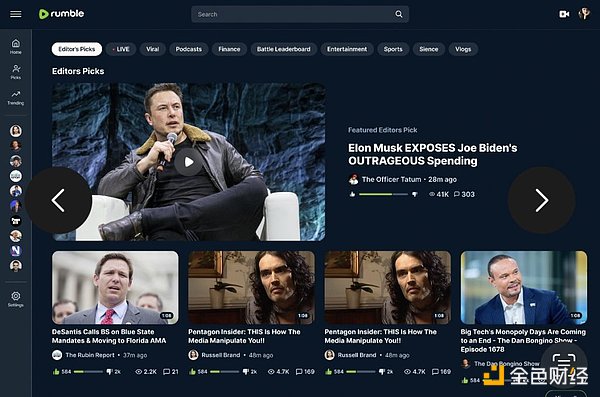Author: Revc, Golden Finance
I. Background and Overview
Founding Time and Founder: Rumble was founded in October 2013 by Canadian technology entrepreneur Chris Pavlovski. It is headquartered in Toronto and its US headquarters is located in Longboat Key, Florida. Its original intention was to provide a platform for small content creators to replace YouTube and solve the problem of the latter's suppression of independent creators' traffic.

Positioning and Vision:
Rumble takes "freedom of speech" and "anti-cancel culture" as its core positioning, claiming to protect the open Internet ecology and support diverse expressions. Although the platform emphasizes neutrality, its user group is highly inclined to conservatives and is often regarded as a representative of the "alternative technology" camp.
Development History:
-Turning point in 2020: Trump switched to Rumble due to being banned by mainstream social media, and the platform users surged from 2 million to 20 million, becoming the center of political discussion.
-Breaking out in 2024: Thanks to the crypto policy dividends of Trump's re-election, Rumble's stock price soared 190%, and it was deeply bound to Trump's Truth Social, providing it with video streaming technology support.
-Strategic upgrade in 2025: Received a $775 million investment from Tether (acquiring 103 million shares at $7.50 per share), and the funds were used for global expansion, cloud service enhancement and crypto integration plans.
II.The strategic logic behind Tether’s investment
1. The resonance of political alliance and encryption layout
Tether’s choice of Rumble is no accident:
-Trump effect: Rumble is known as the “Trump concept stock”, and its user base is highly overlapped with Trump supporters. Tether uses this to strengthen its ties with conservative forces in the United States and cater to the encryption-friendly policies promoted by the Trump administration (such as the Bitcoin reserve plan and opposition to CBDC).
-Policy dividend capture: After Trump’s election, the US crypto regulatory environment has improved significantly. The SEC has turned to "guided regulation". Tether has seized the track of combining the free speech platform with crypto payments by investing in Rumble, paving the way for USDT to penetrate the US market. 2. Ecological synergy and strategic hedging - Creator economic innovation: Rumble plans to integrate Bitcoin and USDT payments and launch the encrypted wallet Rumble Wallet, allowing creators to receive rewards through cryptocurrency and reduce dependence on the traditional financial system. Tether will use this to expand the application scenarios of USDT and consolidate its dominant position in stablecoins.
-Diversified investment layout:Tetherhas been involved in agriculture,AI, brain-computer interface and other fields in recent years.Investing inRumble is a key link in hedging against the volatility of the crypto market and buildingalldglobal distribution network.
3. Financial strength and regulatory game
- Tether's unaudited profit in 2024 reached US$13 billion, and it holds US$94.5 billion in US Treasury bonds and US$7 billion in excess reserves, which provide confidence for its aggressive investment.
- Although Tether CEO Paolo Ardoino expressed caution (needing to wait for clarity of US regulation), the investment in Rumble has released its "testing the waters" signal, and may further expand US business in the future.
Third,Rumble's deep binding with the Trump camp
1. Truth Social's technical pillars
- Rumble provides video and streaming services for Trump's social media platform Truth Social, and the two form a "content + infrastructure" alliance. Trump consolidates his political influence through Truth Social, while Rumble uses this to obtain high-traffic content and enhance user stickiness.
-Political narrative empowerment:Rumble set a record of 1.79 million concurrent online viewers during the 2024 presidential election, becoming the main battlefield of conservative public opinion, which is highly consistent with Trump's"anti-establishment"narrative.
2. The political symbolism of crypto payments
- Rumble plans to support USDT rewards, which is not only a financial strategy to hedge against inflation, but also a political gesture to the crypto community.
-Risk controversy: Rumble's close connection with Trump has raised questions about market manipulation. For example, the WLFI project requires partners to purchase tokens of equivalent value, and is accused of using political influence to lock liquidity, exacerbating the industry's trust crisis.
Fourth, the politicization dilemma and opportunities of the crypto industry
1. Policy dividends and dependence risks
- Trump has fulfilled his promises of loosening regulations and supporting mining. The scale of Bitcoin ETF has exceeded 1.1 million BTC, and institutions such as MicroStrategy continue to increase their holdings. However, the market is overly dependent on a single politician, and policy repetitiveness (such as the game between Congress and the Federal Reserve) may cause violent fluctuations.
- Case warning: The WLFI project suffered a floating loss of tens of millions of dollars due to ETH and BTC positions, exposing the high-risk speculative nature of politically related projects.
2. Compromise of the Decentralized Ideal
- Although the cooperation between Rumble and Tether claims to "break traditional control", its deep binding with the Trump camp reveals that the crypto industry is still difficult to get rid of the intervention of centralized power. For example,Tether consolidates the hegemony of the US dollar by repurchasing US bonds, which forms a subtle conflict with the""concept.
Summary: Finding the value anchor in the political frenzy
The rise of Rumble and the injection of Tether reflect the complex ecology of the crypto industry and political power. It shows the potential of combining free speech platforms with decentralized finance, but we should also be wary of political manipulation and bubble risks. Future challenges: - Rumble needs to balance content review and freedom of speech to avoid becoming a hotbed of extreme speech; - Tether needs to prove that its investment can truly empower the creator economy rather than short-term speculation; This game of freedom, encryption and politics may become a historic experiment in reconstructing the digital power structure.
 Alex
Alex






